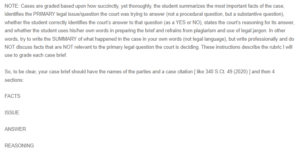Case Brief – Bartenwerfer v Buckley
BARTENWERFER v. BUCKLEY
598 U. S. 69 (2023)
FACTS: Kate and David Bartenwerfer jointly bought a house in San Francisco. They formed a business partnership and began renovating the house so that they could sell it at a profit. During the innovations, Kate was uninvolved, and David took charge of the project. After the renovations were completed, Kate and David sold the house to Kieran Buckley. After Kieran had purchased the house, he discovered that it had some defects, including a leaky roof, a missing fire escape, defective windows, and permit issues. He sued the Bartenwerfers for fraud in California state court, alleging that he had overpaid for the house because of the couple’s misrepresentations. Buckley won the case, and the Bartenwerfers were required to pay more than $200,000 in damages for nondisclosure of material facts, negligence, and breach of contract.
The couple could not pay the damages, so they declared bankruptcy. Buckley filed a complaint in the bankruptcy proceedings and alleged that the debt Bartenwerfers owed him was not non-dischargeable under the exceptions of debt discharge. The Bankruptcy Court ruled that David had committed fraud and had shared his intent to commit fraud with Kate because the couple had formed a legal partnership to renovate and sell the house. The Ninth Circuit overruled the ruling made by the bankruptcy court by arguing that the “should have known or knew” test that the bankruptcy court had applied was not consistent with the Supreme Court precedent in the Strang v. Bradner case. The Ninth Circuit rejected discharging the debt because it was incurred through fraudulent activity. The Ninth Circuit instructed the Bankruptcy Court to consider barring Kate from discharging the debt only if she had a reason or was aware of David’s fraud. The Bankruptcy Court concluded that Kate did not have the requisite knowledge of the fraud committed by David, thus enabling her to transfer her liability to Buckley. The court concluded that the debt could not be discharged because the petitioner did not dispute that Kate and David acted as partners.
ISSUE: Kate and David Bartenwerfer had formed a legal partnership to renovate and sell a house in San Francisco. The house was sold to Kieran Buckley, but at the time of the sale, the house had some defects. When selling the house to Buckley, David knew about the defects, but Kate did not know. After Buckley realized that the house had some defects that had not been disclosed before he purchased the house, he sued the couple for fraud. The couple was required to pay more than $200,000 in damages, but they could not afford it, so they filed for bankruptcy. Kate argued that she did not know about the defects and was not part of the fraud.
ANSWER: Yes
REASONING: The court had a responsibility to determine whether a debtor may, in bankruptcy, discharge a debt from money obtained by a business partner’s fraud when the debtor did not know about the fraud. The Bankruptcy Court focused on the relevant legal context concerning fraud by partners and agents within the partnership’s scope instead of confronting fraud by a person with no partnership or relationship to the debtor because Kate and David acted as partners when selling the house to Buckley. David had to be held liable for the debt that Buckley had incurred when purchasing the house because he knowingly concealed information about the house’s defects when selling the house to Buckley.
References
BARTENWERFER v. BUCKLEY; 598 U. S. 69 (2023).
ORDER A PLAGIARISM-FREE PAPER HERE
We’ll write everything from scratch
Question
NOTE: Cases are graded based upon how succinctly, yet thoroughly, the student summarizes the most important facts of the case, identifies the PRIMARY legal issue/question the court was trying to answer (not a procedural question, but a substantive question), whether the student correctly identifies the court’s answer to that question (as a YES or NO), states the court’s reasoning for its answer, and whether the student uses his/her own words in preparing the brief and refrains from plagiarism and use of legal jargon. In other words, try to write the SUMMARY of what happened in the case in your own words (not legal language), but write professionally and do NOT discuss facts that are NOT relevant to the primary legal question the court is deciding. These instructions describe the rubric I will use to grade each case brief.

Case Brief – Bartenwerfer v Buckley
So, to be clear, your case brief should have the names of the parties and a case citation [ like 340 S.Ct. 49 (2020) ] and then 4 sections:
FACTS
ISSUE
ANSWER
REASONING


